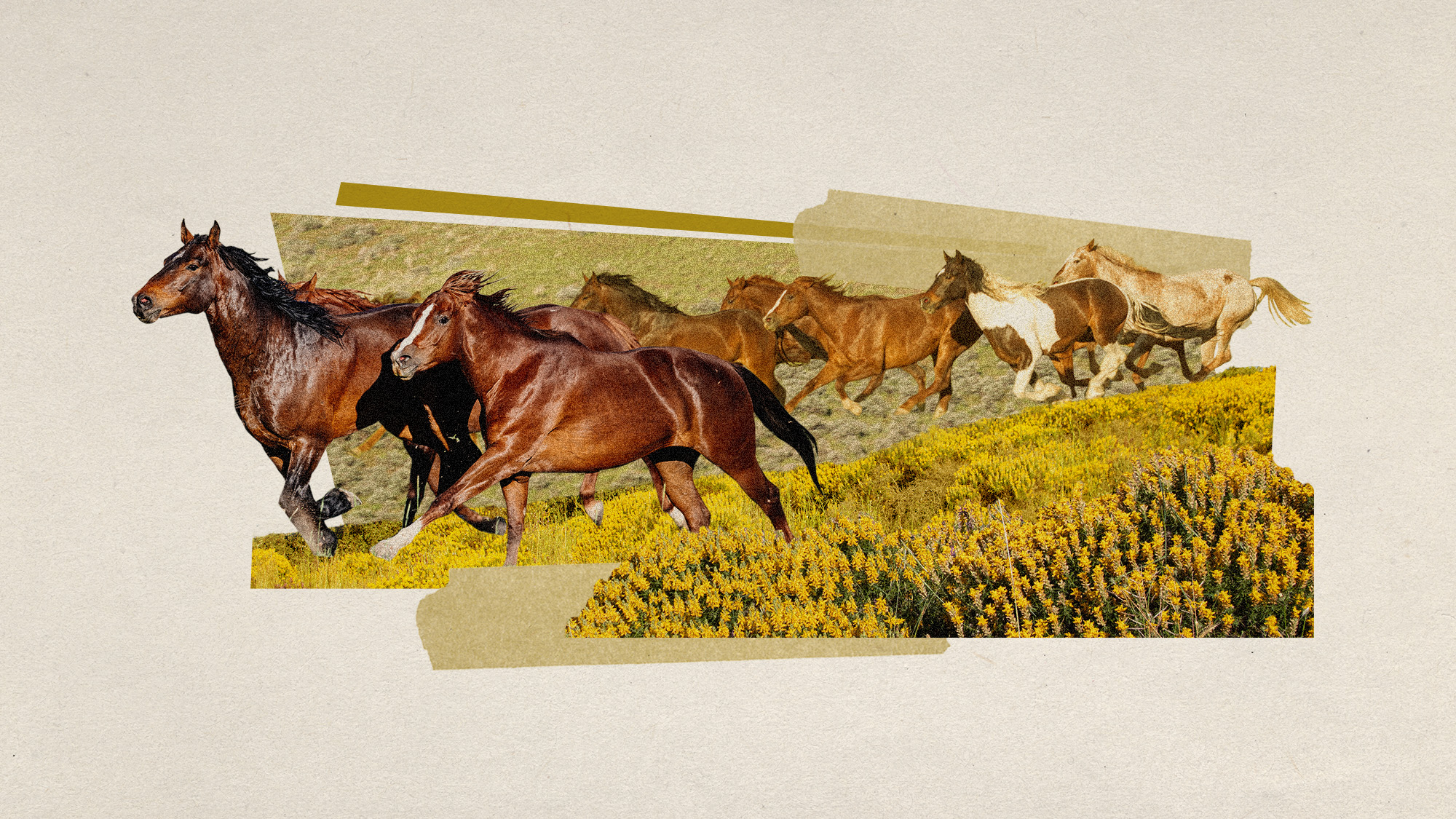How wild horses are preventing wildfires in Spain
The animals roam more than 5,700 hectares of public forest, reducing the volume of combustible vegetation in the landscape

A free daily email with the biggest news stories of the day – and the best features from TheWeek.com
You are now subscribed
Your newsletter sign-up was successful
Wild horses have become a new and unlikely defence against bush fires in the Iberian Highlands.
Recent summers have brought a rampage of wildfires to Europe but with the hottest months approaching again, ecologists hope that horses could play a significant role in reducing the risk.
Horses for gorse
In 2023, the conservation group Rewilding Spain introduced a herd of 10 horses to the Iberian Highlands. The rare horses, known as Przewalski’s, went extinct in the wild but were successfully reintroduced from European zoos.
The Week
Escape your echo chamber. Get the facts behind the news, plus analysis from multiple perspectives.

Sign up for The Week's Free Newsletters
From our morning news briefing to a weekly Good News Newsletter, get the best of The Week delivered directly to your inbox.
From our morning news briefing to a weekly Good News Newsletter, get the best of The Week delivered directly to your inbox.
The horses now roam around more than 5,700 hectares of public forest, reducing the volume of combustible vegetation in the landscape.
They feed on the yellow flowers of gorse – a highly combustible plant. By "selectively clearing" it, the horses "help prevent wildfires", said Laura Lagos, a researcher at the University of A Coruna, whose 2021 study found that wild horse grazing was the most effective method for preventing wildfires.
Other animals, including sheep and bison, can also help reduce wildfire risks through grazing, but wild horses are uniquely adapted to Galicia's rugged terrain and they have "moustaches that appear designed to protect their lips from the prickly gorse", Lagos told Al Jazeera.
Although the equine dectet won't change everything on their own, the Rewilding Spain team leader Pablo Schapira told Positive News that 10 is "a good number to start a new population" and he's "looking forward to seeing how the animals interact with the larger landscape".
A free daily email with the biggest news stories of the day – and the best features from TheWeek.com
Roaming history
For centuries, the Serrano horse was used for "threshing and other agricultural jobs", but "allowed to roam freely when not working", says Positive News.
But the history of wild horses in Galicia "dates back thousands of years" and rock carvings of horses being hunted by humans "suggest their presence in the region during the Neolithic period", said Al Jazeera.
In the 1970s, about 22,000 wild horses "roamed the region’s mountains, forests and heathlands", and the "growing risks" of climate change, habitat loss and "declining herd numbers" show the "urgent need" to protect both the horses and the ecosystems they sustain.
Meanwhile, bison, which have "indiscriminate eating habits", consume over 130 different plant species, "effectively clearing and rejuvenating the landscape" and helping to "prevent the undergrowth from becoming a potential fire hazard", said Euronews.
Chas Newkey-Burden has been part of The Week Digital team for more than a decade and a journalist for 25 years, starting out on the irreverent football weekly 90 Minutes, before moving to lifestyle magazines Loaded and Attitude. He was a columnist for The Big Issue and landed a world exclusive with David Beckham that became the weekly magazine’s bestselling issue. He now writes regularly for The Guardian, The Telegraph, The Independent, Metro, FourFourTwo and the i new site. He is also the author of a number of non-fiction books.
-
 6 of the world’s most accessible destinations
6 of the world’s most accessible destinationsThe Week Recommends Experience all of Berlin, Singapore and Sydney
-
 How the FCC’s ‘equal time’ rule works
How the FCC’s ‘equal time’ rule worksIn the Spotlight The law is at the heart of the Colbert-CBS conflict
-
 What is the endgame in the DHS shutdown?
What is the endgame in the DHS shutdown?Today’s Big Question Democrats want to rein in ICE’s immigration crackdown
-
 The plan to wall off the ‘Doomsday’ glacier
The plan to wall off the ‘Doomsday’ glacierUnder the Radar Massive barrier could ‘slow the rate of ice loss’ from Thwaites Glacier, whose total collapse would have devastating consequences
-
 Can the UK take any more rain?
Can the UK take any more rain?Today’s Big Question An Atlantic jet stream is ‘stuck’ over British skies, leading to ‘biblical’ downpours and more than 40 consecutive days of rain in some areas
-
 As temperatures rise, US incomes fall
As temperatures rise, US incomes fallUnder the radar Elevated temperatures are capable of affecting the entire economy
-
 The world is entering an ‘era of water bankruptcy’
The world is entering an ‘era of water bankruptcy’The explainer Water might soon be more valuable than gold
-
 Climate change could lead to a reptile ‘sexpocalypse’
Climate change could lead to a reptile ‘sexpocalypse’Under the radar The gender gap has hit the animal kingdom
-
 The former largest iceberg is turning blue. It’s a bad sign.
The former largest iceberg is turning blue. It’s a bad sign.Under the radar It is quickly melting away
-
 How drones detected a deadly threat to Arctic whales
How drones detected a deadly threat to Arctic whalesUnder the radar Monitoring the sea in the air
-
 ‘Jumping genes’: how polar bears are rewiring their DNA to survive the warming Arctic
‘Jumping genes’: how polar bears are rewiring their DNA to survive the warming ArcticUnder the radar The species is adapting to warmer temperatures